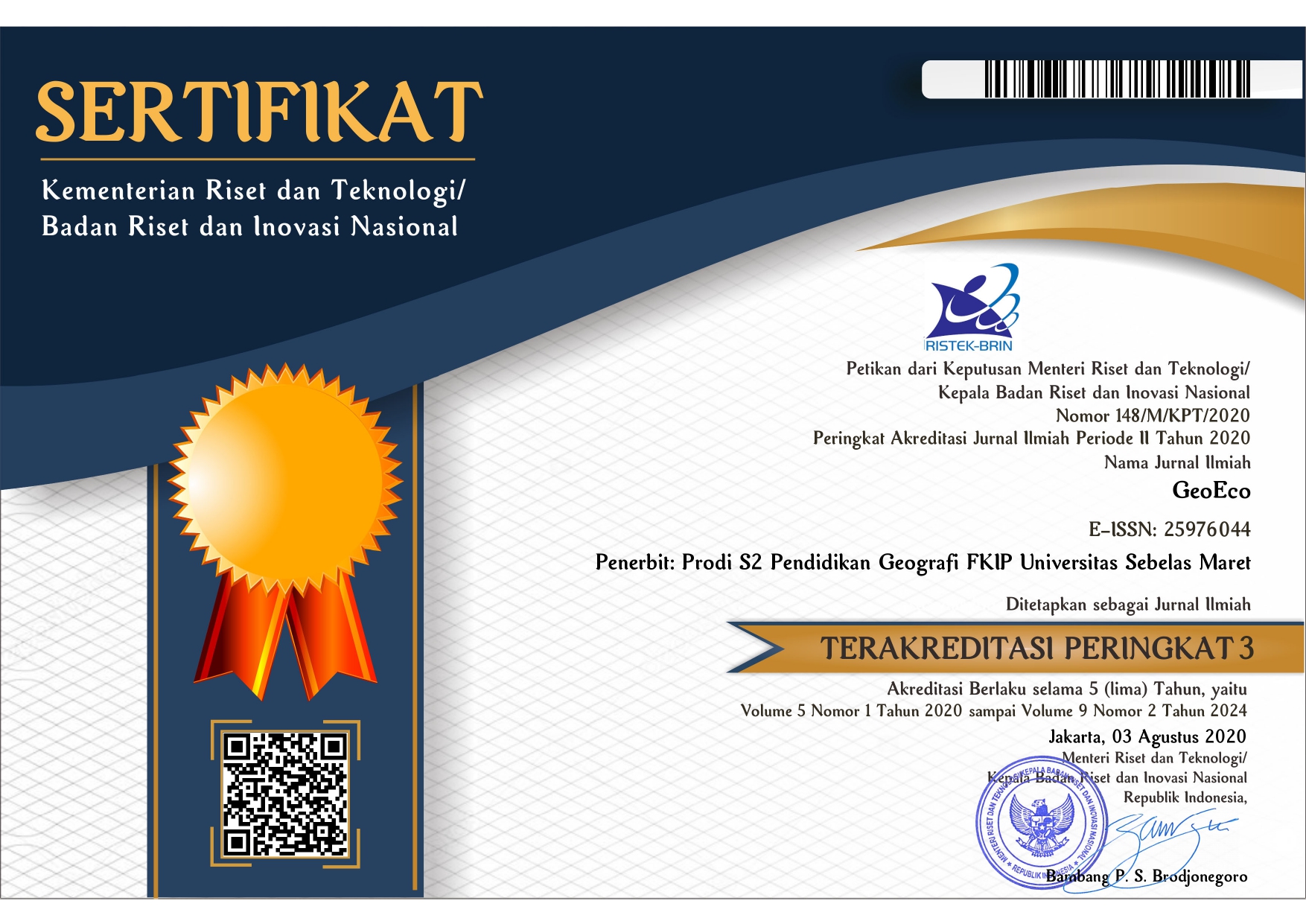THE BEHAVIOR OF WASTE DISPOSAL INTO RIVER AMONG COMMUNITY IN SUNGAI KAKAP SUBDISTRICT WEST KALIMANTAN
Abstract
This research was carried out in the Sungai Kakap Subdistrict, Kubu Raya Regency of West Kalimantan. The waste problem is one of the issues exists in Indonesia. Waste affects the cleanliness of the environment and the surrounding. Disposing waste into a river is an example of irresponsible practices. Nowadays, the river has become a practical and free of charge location to dispose of waste. People tend to develop waste disposal into a river as a habit without caring for the negative impacts of their behavior. The purposes of this research were 1) to determine the behavior of the community in disposing of waste into the river, 2) to find out community knowledge of the environment, and 3) to determine the ecological awareness of the community in the area. The results of this current study indicated that around 70% of the community members utilized the water for their daily needs, such as bathing, cleaning and also as the clean water resources. The score of the behavior of the community regarding waste disposal into the river was 1.570. This was in a "bad" category. The score of the community knowledge on waste disposal into the river was 3.091, included in the "moderate" category with the score ranging from 2.701 – 4.050. People's knowledge of their environment influenced their behavior in disposing of waste into the river. Knowledge about the environment affects people's behavior in disposing of waste into the river. Community awareness began to emerge by doing cooperation activities every Sunday. This involved as many as 71 people or around 78.89% of the community members. The ecological awareness score of the community in disposing of waste into rivers was 3,529, the score was included in the category of "medium" with a score ranging from 2,701 - 4,050. Ecological awareness influenced community behavior in disposing of waste into rivers. In general, the people in the study area realized that disposing waste into rivers was irresponsible and brought a negative impact on the environment, but the habit of throwing waste into rivers was hard to change, it was like a tradition which was not easy to abandon.
Keywords
Full Text:
PDFReferences
Bimo Walgito. (2001). Psikologi Sosial. Jakarta: Andi offset. Chen, L. (2013). A Study of Green Purchase Intention Comparing with Collectivistic (Chinese) and Individualistic (American) Consumers in Shanghai, China. Information Management and Business Review Vol. 5, No. 7, Pp. 342-346, July 2013 (ISSN 2220-3796) A, 5(7), 342–346. Omoogun, A. C., Egbonyi, E. E., & Onnoghen, U. N. (2016). From Environmental Awareness to Environmental Responsibility: Towards a Stewardship Curriculum. Journal of Educational Issues, 2(2), 60. https://doi.org/10.5296/jei.v2i2.9265 Purnami, W., Utama, W. G., & Madu, F. J. (2016). Internalisasi Kesadaran Ekologis Melalui. SEMINAR NASIONAL PENDIDIKAN SAINS, 487–491. Simarmata, B., & Daulae, Abdul Hakim, R. (n.d.). Hubungan Tingkat Pengetahuan Lingkungan Hidup Dengan Sikap Perduli Lingkungan Siswa. Pelita Pendidikan, 6(4), 204–210. Soekidjo Notoatmodjo. (2003). Pendidikan dan Perilaku Kesehatan. Jakarta: Rineka Cipta. Sugiyono. (2016). Metode Penelitian Kuantitatif, Kualitatif, dan R&D. Bandung: Alfabeta. Sulastri, E., Haryadi, T., & Inayah, E. (2019). Tingkat Kesadaran Ekologis Masyarakat Kampung Laut, Kabupaten Cilacap, Jawa Tengah. Jurnal Kawistara, 9(1), 78. https://doi.org/10.22146/kawistara.31484 Utina, R. (2012). Kecerdasan Ekologis Dalam Kearifan Lokal Masyarakat Bajo Desa Torosiaje Provinsi Gorontalo. Prosiding Konferensi Dan Seminar Nasional Pusat Studi Lingkungan Hidup Indonesia Ke 21, 5(September), 14–20.
Refbacks
- There are currently no refbacks.












.png)

